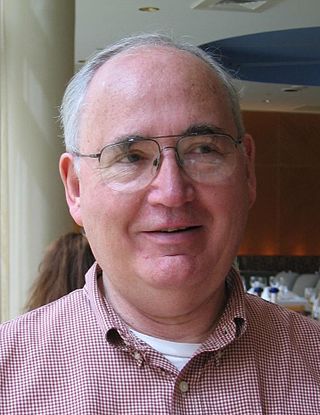Related Research Articles
The Association for Computing Machinery (ACM) is a US-based international learned society for computing. It was founded in 1947 and is the world's largest scientific and educational computing society. The ACM is a non-profit professional membership group, reporting nearly 110,000 student and professional members as of 2022. Its headquarters are in New York City.

Dana Stewart Scott is an American logician who is the emeritus Hillman University Professor of Computer Science, Philosophy, and Mathematical Logic at Carnegie Mellon University; he is now retired and lives in Berkeley, California. His work on automata theory earned him the Turing Award in 1976, while his collaborative work with Christopher Strachey in the 1970s laid the foundations of modern approaches to the semantics of programming languages. He has also worked on modal logic, topology, and category theory.

Kaarlo Jaakko Juhani Hintikka was a Finnish philosopher and logician. Hintikka is regarded as the founder of formal epistemic logic and of game semantics for logic.

John Richard Perry is a professor at Stanford University and the University of California, Riverside. He has made significant contributions to philosophy in the fields of philosophy of language, metaphysics, and philosophy of mind. He is known primarily for his work on situation semantics, reflexivity, indexicality, personal identity, and self-knowledge.
Dov M. Gabbay is an Israeli logician. He is Augustus De Morgan Professor Emeritus of Logic at the Group of Logic, Language and Computation, Department of Computer Science, King's College London.

Alex James Wilkie FRS is a British mathematician known for his contributions to model theory and logic. Previously Reader in Mathematical Logic at the University of Oxford, he was appointed to the Fielden Chair of Pure Mathematics at the University of Manchester in 2007.

The Association for Logic, Language and Information (FoLLI) is an international, especially European, learned society. It was founded in 1991 "to advance the practicing of research and education on the interfaces between Logic, Linguistics, Computer Science and Cognitive Science and related disciplines." The academic journal Journal of Logic, Language and Information (JoLLI) is published under its auspices; it co-ordinates summer schools such as the European Summer School in Logic, Language and Information (ESSLLI), the North American Summer School in Logic, Language, and Information (NASSLLI), and the International Conference and Second East-Asian School on Logic, Language and Computation (EASLLC); and it awards the E. W. Beth Dissertation Prize to outstanding dissertations in the fields of Logic, Language, and Information.

The European Master's Program in Computational Logic (EMCL) was a two years joint MSc programme offering a joint degree between four European universities as a part of the Erasmus Mundus co-operation and mobility programme. So far, this programme had more than 130 students.

Ruy J. Guerra B. de Queiroz is an associate professor at Universidade Federal de Pernambuco and holds significant works in the research fields of Mathematical logic, proof theory, foundations of mathematics and philosophy of mathematics. He is the founder of the Workshop on Logic, Language, Information and Computation (WoLLIC), which has been organised annually since 1994, typically in June or July.
The Department of Information Studies is a department of the UCL Faculty of Arts and Humanities.
Folli is a surname and may refer to:
Lisa Christine Matthewson is Professor of Linguistics in the Department of Linguistics at University of British Columbia with specialties in pragmatics and semantics. She has also done significant work with semantic fieldwork and in the preservation and oral history of First Nations languages, especially St'át'imcets and Gitksan. Matthewson's appointment at UBC was notable because she was the first female full professor in the department's history.
J. Michael Dunn was Oscar Ewing Professor Emeritus of Philosophy, professor emeritus of Informatics and Computer Science, was twice chair of the Philosophy Department, was Executive Associate Dean of the College of Arts and Sciences, and was founding dean of the School of Informatics at Indiana University.
Sonja Smets is a Belgian and Dutch logician and epistemologist known for her work in belief revision and quantum logic. She is Professor of Logic and Epistemology at the University of Amsterdam, where she was the director of the Institute for Logic, Language and Computation (2016-2021) and is affiliated with both the Faculty of Science and the Department of Philosophy. She also holds a visiting professor position at the University of Bergen in Norway.
Nissim Francez is an Israeli professor, emeritus in the computer science faculty at the Technion, and former head of computational linguistics laboratory in the faculty.

Valentin Feodorov Goranko is a Bulgarian-Swedish logician, Professor of Logic and Theoretical Philosophy at the Department of Philosophy, Stockholm University.
Maria D. Aloni is an Italian logician and philosopher of language, interested in formal semantics and the development of forms of logic that can capture the deviations of human reasoning from classical logic. She is an associate professor in the University of Amsterdam Faculty of Humanities, affiliated there with the Department of Philosophy and the Institute for Logic, Language and Computation.
Luigia (Gigina) Carlucci Aiello is an Italian computer scientist, emeritus professor of artificial intelligence at Sapienza University of Rome.